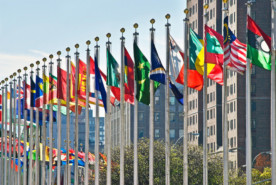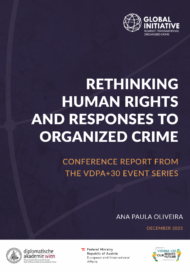Posted on 15 Dec 2017
Drug trafficking features consistently at the forefront of the global policy agenda, as the 2016 UN General Assembly Special Session (UNGASS) on drugs served to show. As one of the most lucrative forms of transnational organized crime, drug trafficking leaves a destructive trail of instability, violence and human suffering wherever it occurs, all too often in already-weakened states.
Although the international community’s response to this threat remains polarized, the UNGASS outcome document shows that it is possible to move forward in a consensual manner. Over previous decades, criminal-justice-based approaches to the drug issue have held sway, focusing on prohibition of the trade through a punitive and combative stance against drug trafficking and usage. These kinds of policies have been criticized by reformists advocating a more nuanced, public-health-based approach to reducing demand for drugs. Prohibitionist policies have been seen as disproportionately criminalizing the poor and vulnerable while being unable to target those at the ‘top of the pyramid’ – the powerful and well-connected groups that control the drug trade. Such policies overburden justice systems and fuel the profitable black market. In this regard, I am pleased that the UNGASS outcome document motivates for a holistic approach to the world drug problem.
A new approach needed to drug trafficking
In a recent joint statement concerning the drugs trade in ASEAN countries, Olusegun Obasanjo, Ruth Dreifuss and Fernando Henrique Cardoso (former presidents of Nigeria, Switzerland and Brazil and acting as Global Commissioners on Drug Policy) argue that ‘with this wider view of how drug policy affects sustainable development in a comprehensive manner, it becomes clear that a public-health approach, respectful of people’s rights and dignity, is the only viable way forward’.
But in the shift towards a harm-reduction approach, the response to the drugs challenge and the role of the criminal-justice system must remain in focus. Here, the challenges on the supply side are evident and, too often, we fail to bring to justice the main actors in the drug markets. What is required is a re-evaluation of how the justice system can be effective in breaking down organized crime. At the same time, increased attention must be given to alternative development, reflecting poverty as a driver of drug production. Experience has shown that alternative development requires sustained, long-term efforts and a close dialogue with poppy and coca farmers if it is to be successful.
The profits accrued by the global drug trade are having a pernicious impact on global governance. The revenue contributes to institutional weakness – through its widely documented influence on official institutions in certain states. This must be recognized and incorporated into the international response.
The impact of drug trafficking on the rule of law worldwide is extensive and chronic. As with other forms of organized crime, drug-trafficking networks exploit institutional fragility to create an environment in which they can operate with impunity. In such contexts, people in public office may facilitate money laundering or trafficking corridors for the networks, and political candidates with criminal links may be supported in campaigns. Such forms of corruption erode relationships between citizens and the state, reduce accountability in government and hollow out institutions.
In some instances, organized-crime groups even usurp the roles of the state, providing services and wielding judicial power. The 2014 report from the West Africa Commission on Drugs illustrates the dramatic impact of drug trafficking on institutional integrity. It raises concerns about drug-trafficking groups that have forged ‘deep inroads’ into state institutions, ‘sometimes at the highest levels’.
The impacts are far-reaching, as corruption reshapes relationships between the state and civil society, between political and security actors, and between national and international business groups. This places pressure on political systems and may increase the risk of polarization and violence around elections.
Organized crime and terrorism: A toxic symbiosis
In some regions, transnational organized crime and terrorism are seen as symbiotic issues. Terrorist groups often engage, directly or indirectly, in criminal activities, such as trafficking of illicit products, including drugs, illegal trade in natural resources, kidnapping and extortion. Similarly, organized-crime groups may employ terrorist strategies and advance a political agenda.
Take the case of Afghanistan, where the interactions between organized crime (particularly in terms of drug production and trade), terrorism and the state are hugely complex. The weakening of the state through decades of turmoil has left a governance vacuum in many parts of the country. Opium production and trafficking enriches organized-crime actors – including the Taliban – who may then occupy this vacuum and wield localized political power. The 87 per cent increase in opium production in Afghanistan in 2017 recorded by the Afghanistan Opium Survey (UNODC, Afghan Ministry of Counter Narcotics) is therefore a real cause for concern.
As with the connections between organized crime and corruption, this interlinking with terrorism illustrates the destructive impact that worldwide illicit markets and criminal activity have on global security.
The resolution approved by consensus at the 7th session of the UNCAC Conference of States Parties (Resolution 7/2) – co-sponsored by 19 governments – represents a breakthrough in promoting recognition of these issues. It aims to enable state parties to prevent and combat corruption more effectively when it involves vast quantities of assets – the first resolution to do so. It advocates a multifaceted approach to corruption that involves very large assets, including financial-disclosure mechanisms for public officials, and ensuring that anti-corruption bodies have the necessary independence to operate effectively. The hope is to shift the perspective of criminal-justice efforts from low-level drug offenders, who are so often disproportionately targeted, and onto the powerful leaders of criminal networks, who command vast resources and exploit high-level connections to facilitate their activities.
It is essential that the UN’s response to drug trafficking – and organized crime as a whole – continues in the direction that this new resolution has set out. Only by recognizing the damage that organized-crime groups wreak on state institutions and their connections to terrorism can a comprehensive and multifaceted response be created. The channels of public health, criminal justice and accountability in governance must be combined to create a complete picture of the drugs trade and its effects, and thus provide a united effort to achieve the integrated and indivisible Sustainable Development Goals.



